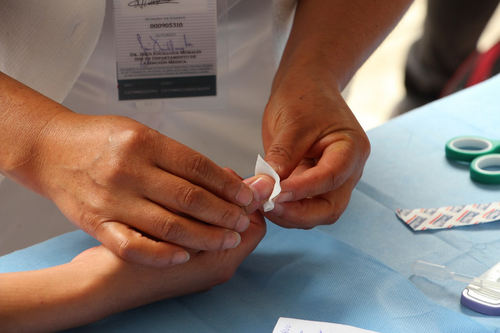
05 Oct Why Future Nurses Should Master the Phlebotomy Test
Phlebotomy, the art of drawing blood, is essential for nurses in today’s healthcare landscape. While it might seem like a basic task, mastering phlebotomy is crucial for providing quality care and enhancing patient experiences. As future nurses, getting comfortable with this skill makes day-to-day tasks smoother and boosts confidence in handling patients.
For aspiring nurses, passing the phlebotomy test is a key milestone. It’s not just about acing the exam, though—it’s about mastering a vital skill that’s used in countless medical settings. To help ease the preparation process, it’s a great idea to start your NHA phlebotomy practice test early on to familiarize yourself with what’s expected.
What is the Phlebotomy Test?
The Basics of Phlebotomy
Phlebotomy is the practice of drawing blood from patients for various medical purposes, such as testing, transfusions, or donations. The phlebotomy test evaluates a nurse’s ability to perform these blood draws safely, efficiently, and with minimal discomfort to patients. It’s a combination of theoretical knowledge and practical skills, ensuring that nurses are prepared for real-world scenarios.
Why It’s Essential for Nurses
Mastering the phlebotomy test is more than just passing a requirement—it’s a skill that nurses will use throughout their careers. Blood draws are a routine part of healthcare, and being proficient in this area means smoother interactions with patients, faster results for doctors, and overall improved care. Starting with a solid understanding by taking a phlebotomy practice test can set the foundation for confidence and competence in this vital task.
Key Advantages of Mastering Phlebotomy
Enhanced Clinical Competence
Nurses who are proficient in phlebotomy stand out in clinical settings. Mastering this skill means fewer errors, quicker procedures, and an overall better workflow. It’s a clear indicator of a nurse’s attention to detail and ability to handle routine medical tasks with ease. Proficiency in phlebotomy shows that a nurse is prepared to tackle the demands of a fast-paced medical environment.
Better Patient Care
When nurses are confident in their phlebotomy skills, patients notice the difference. Blood draws can often be uncomfortable or anxiety-inducing, but a nurse who performs the task with precision and care can help ease patient fears. In turn, this contributes to better patient satisfaction and outcomes, fostering a more positive healthcare experience.
Overcoming Challenges in Phlebotomy
Handling Patient Anxiety
Blood draws can be a nerve-wracking experience for many patients, particularly those with a fear of needles. For nurses, understanding how to calm and reassure patients during phlebotomy is just as important as the technical skill itself. A nurse with excellent bedside manners can make the entire process smoother by talking patients through the procedure, addressing concerns, and being patient-focused. This helps to reduce anxiety and fosters trust between the nurse and the patient.
Dealing with Difficult Blood Draws
Every nurse will face the challenge of a difficult blood draw at some point—whether it’s a patient with hard-to-find veins or one who is dehydrated. Mastering phlebotomy means being prepared for these scenarios and learning how to stay calm under pressure. Developing strong problem-solving skills, practicing alternative methods, and knowing how to find veins even in challenging cases are essential tools for nurses. Overcoming these challenges requires patience and experience, but with consistent practice, confidence grows.
Tips for Acing the Phlebotomy Test
Study and Preparation
Preparation is key to passing the phlebotomy test. A combination of hands-on practice and studying theoretical knowledge ensures that future nurses are well-equipped for the exam. It’s helpful to review anatomy, the proper order of draw, and safety protocols for handling blood samples. Focusing on weak areas and keeping up with updated procedures can significantly boost your chances of success.
Practicing the Skill
As with any skill, practice is the best way to perfect phlebotomy. Nurses should seek out opportunities during clinical rotations or on the job to refine their blood-drawing techniques. Working under the supervision of experienced nurses and receiving feedback can dramatically improve confidence and precision. Practicing with different types of patients and learning to manage unexpected situations is key to becoming proficient.
Phlebotomy: A Key to Your Nursing Future
Mastering phlebotomy is an essential part of becoming a well-rounded nurse. The skills learned not only prepare you for the test but also equip you for handling real-life scenarios in healthcare settings. Future nurses who take the time to practice and prepare will find themselves more confident in their ability to draw blood, leading to better patient care and smoother clinical operations.
Phlebotomy is also a key skill that sets you apart in the job market. Employers are constantly looking for nurses who are proficient in essential tasks like blood draws, and being able to showcase your expertise in phlebotomy can give you an edge. Whether you’re working in a hospital, clinic, or specialized medical facility, having a solid foundation in phlebotomy makes you a valuable asset to any healthcare team.
————–
The information on MedicalResearch.com is provided for educational purposes only, and is in no way intended to diagnose, cure, or treat any medical or other condition.
Some links may be sponsored. Products above are not warranted or endorsed.
Always seek the advice of your physician or other qualified health and ask your doctor any questions you may have regarding a medical condition. In addition to all other limitations and disclaimers in this agreement, service provider and its third party providers disclaim any liability or loss in connection with the content provided on this website.
Last Updated on October 5, 2024 by Marie Benz MD FAAD

